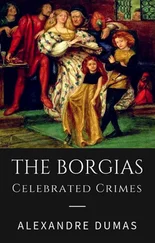Eventually, when Giulio had partially recovered his sight, Ippolito was admitted back into Ferrara, where he was induced to make a guarded apology; and that, Alfonso hoped, would be the end of the matter. But Giulio, still in great pain and finding comfort only in darkened rooms, remained bitterly resentful, not only of the cardinal but also of Duke Alfonso, whom he blamed for not charging Ippolito with his crime.
The duke and duchess returned to Ferrara, as was the custom, to celebrate Christmas, New Year, and Carnival in the ducal capital. Lucrezia clearly enjoyed herself, joining in the dancing, relishing the saucy comedies that she asked to be performed at the ducal theatre during Carnival, when she became a familiar figure in the streets, through which she rode wearing a mask, sometimes in a white dress, at other times gold. She did what she could to comfort Giulio, endeavouring to find him a profitable appointment with the Knights of Malta. She also went out of her way to help the tiresome, importunate Angela Borgia, who had discarded the no longer handsome Giulio without, apparently, a second thought and had recently been betrothed to the young Alessandro Pio and now badgered Lucrezia for help in purchasing an extravagant trousseau, including an extremely expensive dress of cloth-of-gold.
While the court laughed and joked and danced, Giulio remained in his darkened room, his resentment growing as he listened to the revelries outside on the city streets. He had begun to recover his sight; at first murky outlines could be seen of faces and objects, but his vision soon cleared. Still in intolerable pain, however, he thought of little other than the revenge he would inflict on Ippolito and Alfonso. He was joined by his half-brother Ferrante, his companion in the carefree exploits of earlier days, who had hopes of usurping Alfonso as Duke of Ferrara. They discussed ways of achieving their aims; they drew others, as incompetent as themselves, into their conspiracy; they discussed methods of poisoning, possible ambushes, traps and snares and disguises. ‘Something sinister is being planned,’ Isabella d’Este’s friend Bernardino di Prosperi wrote to her at Mantua. ‘I don’t think things will ever be right again between Don Giulio and the Cardinal.’
Meanwhile, Cardinal Ippolito’s informers had begun to hear rumours of the plotters and their wretched schemes; during the summer several men, including one of Giulio’s servants, were arrested. Giulio himself took advantage of Alfonso’s absence from Ferrara on a trip to Venice, to escape to the security offered by Isabella in Mantua. When the duke came home in early July, he ordered his half-brother to return home. Giulio refused, claiming that his life was in danger in Ferrara. In an attempt to mediate between the brothers, Francesco Gonzaga formally requested Alfonso to guarantee Giulio’s safety. Alfonso replied that he promised to stand surety for Ippolito’s actions but warned Giulio that he could not protect him from the law if he was to be found guilty of treason.
Finally it was Ferrante who betrayed the conspirators and told of Giulio’s involvement in the affair. Alfonso was appalled at the realization that his own brothers were plotting his assassination. Ferrante was arrested, along with the other plotters, with the exception of Giulio, who preferred to remain in Mantua under the protection of Francesco and Isabella.
The trial opened on August 3; and a month later all were found guilty and condemned to death by execution. Alfonso, however, had been fond of his brothers and decided to reprieve them, sentencing the two young men instead to life imprisonment in the castle dungeons. For Ferrante, life imprisonment entailed captivity for forty-three years until his death; for Giulio, fifty-three years, until he was released by his great-nephew, Lucrezia’s grandson Duke Alfonso II.
At the end of November 1506, after a year that had seen her husband suffer so much anguish, Lucrezia brought him news that gladdened both their hearts; she was pregnant again and would, God willing, bear this child. At the same time welcome news arrived from Spain: Cesare had escaped from prison and was on his way to the safety of the court of his brother-in-law, who was now king of Navarre. Lucrezia awaited eagerly to hear what he would do next; she herself was prepared to do all she could to help him.
Her gaiety was plain for all to see that year during Carnival in 1507, when Francesco Gonzaga, now captain-general of the papal forces, came to Ferrara to discuss future operations with Duke Alfonso, who, by now quite unconcerned by his wife’s obvious attraction to this man, raised no objection to the attentions that she and Gonzaga paid to each other, to the time they spent in each other’s company, to their dancing together at ball after ball. Abandoned yet graceful, she threw herself energetically into the excitement of the palace dances until she had to take yet again to her bed.
All the excitement had proved too much for Lucrezia, who, in the middle of January, suffered yet another miscarriage. Alfonso despaired and chided his wife for her lack of proper care for her condition; too much dancing, he remonstrated, and too much revelry. She also had to endure the news, which arrived a few weeks later, that Isabella had given birth to her third son, whom she named Ferrante, in honour of her brother, languishing a prisoner in the castle dungeons.
— CHAPTER 27 — The End of the Affair
‘THE HARDER I TRY TO PLEASE GOD, THE HARDER HE TRIES ME’
ONCE SHE HAD RECOVERED from her miscarriage, Lucrezia took up with a reforming friar in the tradition of Savonarola who proposed, among many other penances, a tariff of ‘fines to curb profanities’ — 1 ducat for taking the name of a saint in vain, for example, or 2 ducats for an oath involving Our Lord or the Virgin Mary. This was too much for the good citizens of Ferrara, who proposed invoking the help of Duchess Lucrezia by sending a deputation asking her to propose to the friar that, rather than urging the punishment of blasphemers and the forsaking of cosmetics and décolletages, he should preach against more heinous sins. Lucrezia undertook to speak to him but seems to have contented herself by remonstrating with her ladies about their often scandalous behaviour.
Then, on April 22, 1507, an unexpected visitor arrived in Ferrara with dreadful news. It was one of Cesare’s squires, who had travelled from Navarre to tell Lucrezia that her brother was dead, killed in battle, as Cesare had always suspected he would be, some six weeks earlier, fighting for the king of Navarre. ‘The harder I try to please God, the harder he tries me,’ wept Lucrezia when she heard. In reply to a letter from her husband, who was in Genoa with Louis XII and had penned a hasty note to her commiserating with her loss, she wrote that she hoped he could ‘return home as soon as possible, which is what I wish with all my heart.’ She then, in her grief, took to her bed; indeed, she was not seen in public for so long that rumours abounded that she was pregnant again.
By the summer, however, she had recovered enough to renew her affair with Francesco Gonzaga, who she knew was deeply attracted to her and with whom she was in love. This was a dangerous liaison and became even more so when Ercole Strozzi — who had acted as go-between when Lucrezia was entangled with Pietro Bembo — and Ercole’s brother Guido Strozzi, who lived in Mantua, now became carriers of letters between the marquis and Lucrezia.
Their correspondence was interrupted at the end of 1507 when Lucrezia again became pregnant. On this occasion she was far from being so nervous as she had been during previous pregnancies. Indeed, she entered enthusiastically into discussion about the design of the baby’s elaborate cradle and its clothes and the interviewing of would-be wet nurses. She relished the sweetmeats that were sent to her from Spain by her sister-in-law as well as the almond pastries filled with honey and nougat that she ate in the steaming water of her bath or while playing idly with her countless pearls.
Читать дальше











